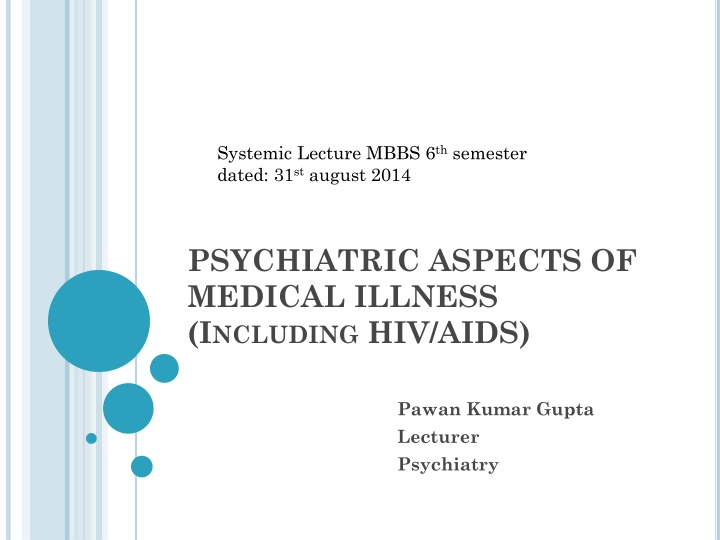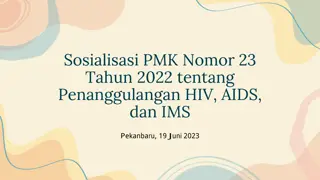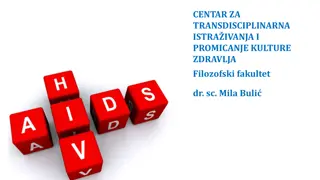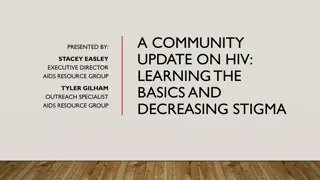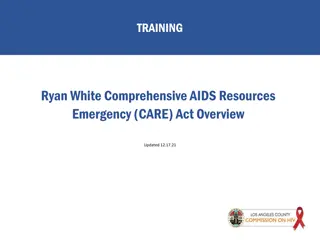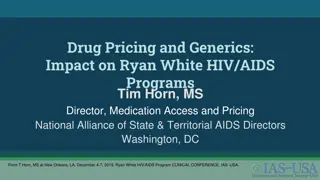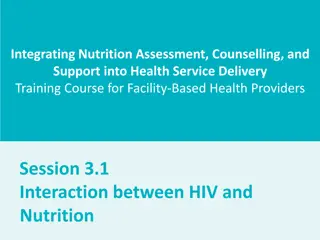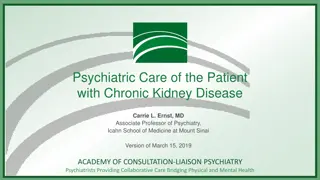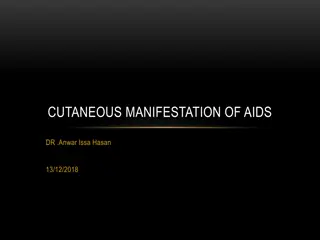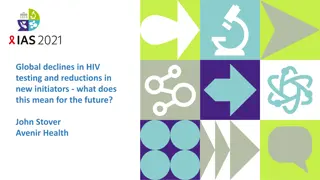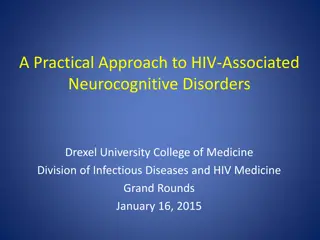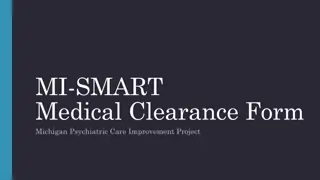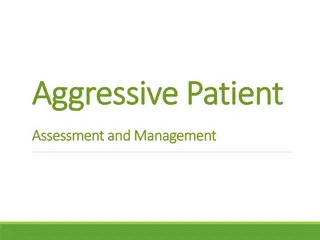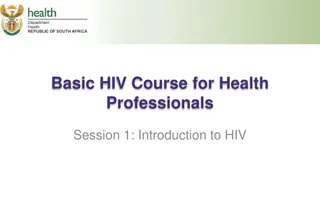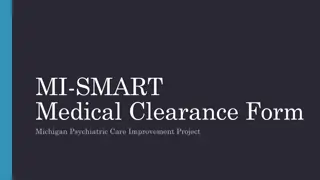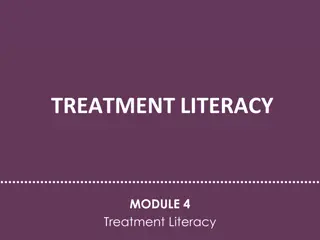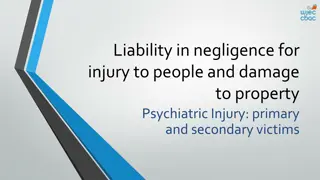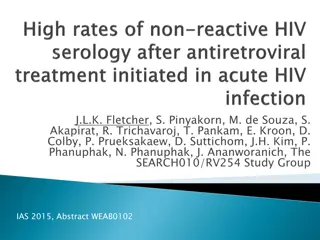Psychiatric Aspects of Medical Illness in HIV/AIDS Patients
Psychiatric aspects of medical illnesses, including HIV/AIDS, are explored in this lecture. The interrelation between psychiatric disorders and medical conditions, types of psychiatric illnesses in medical disorders, and the impact of medical disorders on psychiatric health are discussed. Emphasis is placed on common medical disorders like HIV/AIDS, cancer, endocrine disorders, metabolic disorders, vitamin deficiencies, cardiovascular disorders, and respiratory disorders. The lecture highlights the importance of understanding the relationship between medical illnesses and psychiatric disorders to provide holistic care to patients.
Download Presentation

Please find below an Image/Link to download the presentation.
The content on the website is provided AS IS for your information and personal use only. It may not be sold, licensed, or shared on other websites without obtaining consent from the author.If you encounter any issues during the download, it is possible that the publisher has removed the file from their server.
You are allowed to download the files provided on this website for personal or commercial use, subject to the condition that they are used lawfully. All files are the property of their respective owners.
The content on the website is provided AS IS for your information and personal use only. It may not be sold, licensed, or shared on other websites without obtaining consent from the author.
E N D
Presentation Transcript
Systemic Lecture MBBS 6th semester dated: 31st august 2014 PSYCHIATRIC ASPECTS OF MEDICAL ILLNESS (INCLUDING HIV/AIDS) Pawan Kumar Gupta Lecturer Psychiatry
INTRODUCTION How psychiatric and medical illness are inter-related Why to study psychiatric aspects of medical illness Types of psychiatric illnesses in medical disorders Psychiatric disorders due to general medical condition Psychiatric aspects of common medical disorders: Psychiatric aspects of HIV/AIDS Psychiatric aspects of cancer Psychiatric aspects of endocrine disorders Psychiatric aspects of metabolic disorders Psychiatric aspects of vitamin deficiencies Psychiatric aspects of cardiovascular disorders Psychiatric aspects of respiratory disorders Conclusion
HOWMEDICALILLNESSANDPSYCHIATRIC DISORDERSAREINTER-RELATED Eg. CAD and hypertension leads to stress that one is suffering from lifelong illness and hopelessness. It also leads to increased cortisol which predisposes to depression Depresssion and poor CAD outcome are linked due to platelet dysfunction(platelet factor 4 and thromboglobulin ), autonomic dysfunction and abnormalities of inflammation Depressive patients are often non- compliant, less active which further worsens CAD/hypertension Stress Malnutrition Non-compliance Increased morbidity and mortality* Medical disorders Psychiatric disorders Increased predisposition Stress * CHF patients with depression have 5 year mortality of 36% as compared to 16 % in non depressed patients
WHYTOSTUDY Common predisposition of medical illness and psychiatric disorders Medications of medical disorders may predispose or exacerbate psychiatric illness Drug-drug interactions
MEDICAL DISORDERS Comorbid psychiatric illness from beginning per se Psychiatric illness as a reaction to medical illness Direct physiological effect leading to psychiatric disorders
PSYCHIATRIC DISORDERS DUE TO GENERAL MEDICAL CONDITIONS DSM-IV TR defines mental disorder due to a general medical conditionas a syndrome characterized by the presence of mental symptoms that are judged to be the direct physiological consequence of a general medical condition MENTAL DISORDER DUE TO A GENERAL MEDICAL CONDITION, DSM-IV-TR DELINEATES THREE GENERAL CRITERIA THAT MUST BE MET: There is evidence from the history, physical examination, or laboratory findings that the disturbance is the direct physiological consequence of a general medical condition. The disturbance is not better accounted for by another mental disorder. The disturbance does not occur exclusively during the course of a delirium Abouesh, Ahmed MD; Stone, Chip DO; Hobbs, William R, Journal of Clinical Psychopharmacology:February 2002 - Volume 22 - Issue 1 - pp 71-81 Unusual presentation Temporal relationship Specific lab findings suggestive of association Other anti-microbial known to cause mania: clarithromycin, ciprofloxacin and oflaxacin,metronidazole# *Isoniazid- and ethambutol-induced psychosis;Prasad R,Rajeev Garg:Ann Thorac Med. 2008 Oct-Dec; 3(4): 149 151. #Antimicrobial-Induced Mania (Antibiomania): A Review of Spontaneous Reports Isoniazid or ethambutol induced psychosis: Seen within a week of start of medications Associated with disorganisation,incoherence and visual hallucination along with other features Improves on withdrawing the medications Pyridoxine deficiency hypothesized but not clearly implicated*
Cognitive disorders Psychiatric disorders due to general medical conditions Sexual and sleep Mood disorders Anxiety disorders Psychotic disorders
Chest radiograph. Electrocardiogram. Urinalysis Structural brain imaging: Computed tomography/ magnetic resonance imaging Functional magnetic resonance imaging Positron emission tomography Single photon emission Computed tomography Complete blood count. Electrolytes,Calcium, magnesium, and phosphorus. fasting glucose Blood urea nitrogen and creatinine Liver function tests Thyroid function tests Rapid plasma reagin/Venereal Disease Research Laboratory Vitamin B12 and folate Erythrocyte sedimentation rate Arterial blood Catecholaminesgases Ceruloplasmin Laboratory Investigations Cerebrospinal fluid for biomarkers, infectious agents
TREATMENT OF PSYCHIATRIC DISORDERS DUE TO GENERAL MEDICAL CONDITIONS The mainstay of treatment is the correction or amelioration of the underlying medical condition or discontinuation of the offending substance or exposure. Psychopharmacological interventions are typically used to treat associated mood or behavioral symptoms especially when correction of the causal medical condition does not result in remission of these symptoms. (these agents must be used with caution in older adults). Psychotherapeutic interventions include behavior modification and cognitive retraining. Other specific interventions promote life coping strategies, educate patients about illness course or suffering, and bolster supportive networks with family and friends.
HIV/AIDS AND ITS PSYCHIATRIC ASPECTS HIV/AIDS Psychiatric disorders Counselling Regarding tests Regarding illness Management
Dementia HIV/AIDS AND ITS PSYCHIATRIC ASPECTS Present in 7-25% of hospitalized psychiatrically ill patient HIV associated is seen in late stages of HIV illness usually in patients with CD4 count less than 200/mm3 Risk factors include high HIV RNA viral load, older age, anaemia, illicit drug use and female sex HIV associated dementia markers are CSF HIV RNA,CSF beta microglobulin and prostaglandins Typical triad includes that of subcortical dementia memory and psychomotor speed impairments, depressive symptoms and movement disorders. Apathy is an early symptom of HIV associated dementia Depression in AIDS dementia presents mostly as irritable mood and anhedonia instead of sadness and crying spells Significant number of patients also develop psychotic and mania(approx 8%) HIV associated dementia is rapidly progressive , usually ending in death within 2 years HIV associated dementia is strong risk factor for suicide Zidovudine has been found to improve dementia Risperidone and clozapine has been used in psychosis and have been found to be effective and with few EPS
HIV/AIDS AND ITS PSYCHIATRIC ASPECTS DEPRESSION: Management: EPIDEMIOLOGY : HIV patients are more prone to side-effects Drugs should be started at subthreshold dosage and raised slowly Prevalence 15-40% among AIDS patients.50% increase in prevalence in treatment seeking group. Fluoxetine , sertraline , paroxetine, venlafaxine , mirtazapine have been studied and have been found affective in 70-90% patients. More non- adherance due to side-effects for TCA like imipramine More associated with suicide Supportive psychotherapy, CBT majorly focussing on guilt, anger as the source of illness shame and regarding substance use. Fatigue and insomnia have been found to be correlated with depression than CD4 count Drug-drug interaction: anti retrovials(except nevirapine) are inhibitors of CYP 3A4 so possible interaction with fluoxetine, trazodone, venlafaxine amitriptyline and clomipramine. D/D:non-pathological grief states, adjustment disorder dementia, substance induced, testosterone deficiency and due to infections like toxoplasmosis and lymphoma Ritonavir is inducer at CYP 1A2 possible inteaction with fluoxetine amitriptyline duloxetine Drugs used in HIV like efavirenz, interferon and corticosteroids are associated with depression
HIV/AIDS AND ITS PSYCHIATRIC ASPECTS Bipolar disorder 10 times more prevalence of mania as compared to general population HIV induced mania associated with low CD4 count(below 100 cells/mm3) Could be primary or secondary Clinical features: more irritability, less verbosity, more chronic course than episodic(have malignant course) and cognitive decline. High risk behavior increased. Management: More advanced HIV more sensitive patient for side- effects (both EPS and delirium) Lithium better avoided Carbamazepine has high interactions along with bone marrow suppression(retroviral drugs and HIV also associated with marrow suppression) Valproate found to be effective(comparatively better) Reports of effectiveness of Olanzapine(helpful as increases weight and less chances of EPS)
Triple diagnosis Concomittant treatment important Even non injection users are at increased risk due unsafe sex related risk May further increase substance use after diagnosis HIV/AIDS AND ITS PSYCHIATRIC ASPECTS Substance use disorder Anxiety PTSD Stress management and relaxation techniques Group counseling Psychotherapy directed at emotional distress reduction Relapse prevention models of reducing high risk behaviors ADHERENCE counseling: long term illness and symptomatic course Psychosocial interventions for adherance Schizophrenia
PSYCHIATRIC ASPECTS OF CANCER Depression: Almost 25% cancer patients suffer from depression Oropharyngeal (22-57%), pancreatic (33-50%) breast and lung cancer(upto 40%) Those with advanced disease, poor physical condition, uncontrolled pain, previous history of depression or significant looses are associated. Diagnosis rests on psychological symptoms like low mood, hopelessness, low self esteem, suicidal thoughts etc Reason for depression in cancer: Stress related to cancer diagnosis and treatment Nutritional deficiencies and endocrine abnormalities Medications(corticosteroids, interferon, vincristine vinblastine associated) Brain metastsis Recurrence of affective disorder Treatment: Psychotherapeutic approaches SSRI, mirtazapine and venlafaxine have been found to be useful TCAs(nortriptyline and desipamine) have been used to treat both depression and neuropathic pain
PSYCHIATRIC ASPECTS IN CANCER ANXIETY:Radiation phobia, needle phobia and claustrophobia interfere with treatment Sudden severe anxiety in cancer patients is mostly due to pulmonary embolism Severe, intermittent anxiety associated with exacerbation of pain PTSD common in women with breast cancer (upto 10%).Younger age, lees education, advance disease are associated with PTSD Emotional support and informationbehavior intervention and relaxation. Group and individual psychotherapy Antidepressants, benzodiazepines and low dose neuroleptics are indicated Anxiety Suicide Mania Corticosteroids most common reason Interferons also implicated Psychosis Delirium Delirium :Seen in 40-80% patients Drugs like corticosteroids,interferon. Methotrexate, interleukin and cytarabine primarily implicated among medications
PSYCHIATRIC ASPECTS OF CANCER Psychotherapy Psychotherapy in cancer patients Helps in: Accepting diagnosis Sorting out treatment options Overcoming the fear Depression or denial Enhancing patients ability to cope with cancer treatment Thus enhancing sense of control and reducing distress Therapies used: Cognitive behavior therapy Group therapy Self help groups Supportive expressive psychotherapy
2 to 3 times higher prevalence of depression in diabetes Depression associated with worse glycaemic control and complications Retinopathy ,nephropathy , cardiac dysfunction more common Reciprocal relation diabetes also predisposes to depression. Depression predisposes to type2 diabetes Standard treatment of depression is advisable Controlled trials of fluoxetine and nortriptyline have been done both relieved depression however fluoxetine improved hyperglycaemia too Patient receiving CBT in comparison to supportive therapy had signitficant improvement in HbA1c levels DEPRESSION SHOULD ALWAYS BE Diabetes typically recedes once drugs are withrawn 10-25% Bipolar Patients suffer from diabetes 2-4 times greater risk of developing diabetes in schizophrenia Poor life-style and importantly anti-psychotics implicated 5HT1A antagonism responsible for such relationship(hyperglycaemia) Sudden onset of ketoacidosis , hyperosmolar coma have been Recurrent hypoglycaemia PSYCHIATRIC ASPECTS IN ENDOCRINE DISORDERS Cognitive dysfunction:adolescent and children of diabetes onset before 6 years have cognitive difficulty particularly in vocalbulary and speed of processing Diabetes Depression Eating disorders: Eating disorders are more common in type 1 diabetes Women with type1 diabetes may use insulin manipulation(administer reduced insulin doses) as a means of caloric purging Rates of omission high in early adulthood and late adolescence Sexual dysfunction BPAD and schizophrenia reported with anti-psychotics in diabetics predict poor performance in attention and short term memory Chronic hyperglycaemia associated with micro and macrovascular changes and dementia(primarily vascular dementia) But sudden emergence commonly seen in patients having glucose intolerance ,family history,gestational diabetes etc Sexual disorders Nearly three fold increase in erectile dysfunction Other problems include loss of sexual interest,ejaculatory disturbance , persistent morning erections in one half patients and increased spontaneous erections Sexual problems correlate with chronicity of diabetes ,its complications,reduced level androgens,smoking and weight gain Sildenafil has been to be beneficial in these patients Eating disorders Cognitive functioning SUSPECTED IN PATIENTS WHO ARE HAVING DIFFICULTY ADAPTING TO DIABETES AND SHOW POOR OR WORSENING CONTROL
PSYCHIATRIC ASPECTS IN ENDOCRINE DISORDERS Hypothyroidism In early hypothyroidism circulating T4 level drop, while T3 level remain in normal range. Congenital hypothyroidism Associted with mental retardationshort stature and puffiness of face and hands Treatment with thyroid hormone before age of 3months can result in normal intelligence Depression T4 is preferentially used by brain and is more sensitive to brain Subclinical hypothyroidism is potential risk for depression 40% rapid or mixed bipolar have subclinical hypothyroidism Myxoedema madness earlier common Difficult to differentiate from Axis I Psychotic symptoms remit when TSH levels return to normal Another possibility is Hashimoto s encephalopathy( delerium with psychosis, seizure, focal neurological signs associate with high serum anti- thyroid antibody concentration, responsive to corticosteroids :its autoimmune disorder) Congenital hypothyroidism Cognitive dysfunction Memory impairment is commonly seen in hypothyroidism Either due to direct affect of hypothyroidism or due to depression Patients receiving thyroxine and triiodothyronine respond better than those being prescribed thyroxine alone Psychosis
PSYCHIATRIC ASPECTS IN ENDOCRINE DISORDERS Hyperthyroidism Most common psychiatric symptoms associated with graves disease are Irritability (78%) Shakiness (77%) Slowed thinking(40%) Depression, mania have also been reported In younger patients hyperthyroidism presents as hyperactivity and at old age presents as depression Treatment of these conditions are indicated however correction of thyroid dysfunction is primary
PSYCHIATRIC ASPECTS IN ENDOCRINE DISORDERS Other disorders Hyperparathyroidism may present as hypercalcaemics sympyoms likethirst, anorexia, frequency in urination and depression May be iatrogenic(radiation therapy or lithium) Mild hypercalcaemia:lack of spontaneity/initiative Moderate hypercalcaemia(10- 14mg%):dysphoria,nxiety, irritability Severe (>14mg%):hallucinations, delusions or delirium Depression in 50-70% of patients Psychiatric symptoms precede other symptoms Depression due to hypothalamic dysfunction or increased cortisol Other common manifestations are anxiety, cognitive dysfunction,psychosis(erotomani a) Misdiagnosis of bipolar has been often made in cyclical cushings Hyperparathyroidis m Cushing s syndrome disease Pheochromocytoma Adrenal medulla tumors Presents with profuse sweating, headache, palpitation and sense of impending doom Mimics panic disorder, migraine, cluster headache or subarachnoid haemorrhage Both TCAs and SSRI have been shown to unmask the silent pheochromocytoma
PSYCHIATRIC ASPECTS IN METABOLIC DISORDERS May present as confusion,lethargy, stupor or seizure SIADH due to psychiatric drugs(carbamazepine) Hyponatremia Delirium, seizure and cognitive dysfunction Hypophasphatemia Hypernatremia Anxiety ,irritability and weakness Hypokalemia more commonly linked with eating disorders Hypokalemia
Seen in pernicious anaemia,peptic ulcer disease, alcohol dependence and in eating disorders Megaloblastic anemia, dementia, delirium, catatonia,psychosis and anxiety disorders Psychiatric symptoms may be sole presenting feature PSYCHIATRIC ASPECTS IN VITAMIN DEFICIENCIES Caused due to niacin deficiency Classic triad has dementia, diarrhoea and dermatitis Vitamin B12 deficiency Pyridoxine deficiency(B6) Migraine,seizure and chronic pain could be a manifestation Pellagra Common in alcoholics,pregnant women and those on anti-convulsants Presents as depression and cognitive dysfunction Wernicke-korsakoff psychosis Thiamine deficiency Folate deficiency
Psychiatric aspects of cardiovascular disorders Depression : Upto 30 % CAD patients have depression No difference in presentation Alpha and beta blockers along with Clonidine & digoxin have been associated with depression TCAs prolong QT interval should be avoided(other notable side-effect is orthostatic ypotension) SSRI improve platelet function selectively through serotonin and improve both depression and cardiac outcome Adequate doses should be used no need for adjustment till severe right heart failure Sertraline most studied(drug of choice) Sertraline and beta blocker given together may cause exacerbation of bradycardia and sinus arrest
Apparent clinging to symptoms of disease and resulting disability It is uncoscious face saving means to escape otherwise intolerable life stress related to work,interpersonal relationship etc PSYCHIATRIC ASPECTS OF CARDIOVASCULAR DISORDERS Cardiac neurosis Anxiety Sleep apnea In atrial flutter :clozapine,olanzapineand paliperidone and QT prolonging drugs(pimozide), TCA should be avoided Anxiety : 5-10% have anxiety Minor anxiety symptoms mostly related to fear of inevitable death, acceptance of cardiac problems 11-37% patients of CHF may have obstructive sleep apnea It leads to increased hypoxia, raised intrathoracic presure and BP Leading to increased mortality Psychiatric side effect of drugs Delirium Digoxin :visual hallucination,delirium Propranolol:fatigue,sexual dysfunction and depression Lidocaine :agitation,delirium Carvedilol :fatigue,insomnia
PSYCHIATRIC ASPECTS IN RESPIRATORY DISORDERS DISORDERS Anxiety Depression Sexual dysfunction Sleep disturbances Cognitive dysfunction due to hypoxemia Rarely delirium and psychotic features due to hypoxia Asthma Sarcoidosis COPD Lung cancer Tuberculosis More severe symptoms linked with anxiety than objective respiratory reserve measures Anxiety and depressive symptoms have been associated with relapse and successful long term outcome
Conclusion Both psychiatric and medical disorders either predispose or worsen each other The concomittant presence of both the disorders leads to increased morbidity and mortality Psychiatric disorders in medical illness pose a unique challenge considering there diagnosis and management A close eye on the symptomatology of the patients as well as on their needs will help in reducing the suffering Drug-drug interaction and side-effect profile of medications has to be taken care of while prescribing in these illnesses Therefore it is important for both physicians and psychiatrists to have good understanding of both psychiatric and physical illness.
Bibliography Textbook of psychosomatic medicine; James L. Levenson,(2005) Comprehensive textbook of psychiatry;Benjamin Sadock,virginia Sadock and Pedro Ruiz, ninth edition(2009) Lishmann s organic psychiatry, A textbook of neuropsychiatry,fourth edition (2009)
Multiple Choice Questions
1. Psychosis is side effect of A)Pyrazinamide B)isoniazide C)rifampicin D)none 2. What is false about HIV/AIDS a) HIV patients are more prone to side-effects b) Drugs should be started at subthreshold dosage and raised slowly c) Supportive psychotherapy does not work d) all of the above. 3. Psychotherapy in cancer patients Helps in except: a. Accepting diagnosis b. Sorting out treatment options c. reducing chances of metastasis d. Depression or denial 4. following is true about Eating disorders: a) Eating disorders are more common in type 2 diabetes b) Women with type1 diabetes may use insulin manipulation (administer reduced insulin doses) as a means of caloric purging c) Rates of omission high in late adulthood and early adolescence d) none
5. Biopsychosocial model includes except a) Biological aspect of an illness b) psychological aspect of an illness c) social dishormony d) social factors in illness 6. HIV/ AIDS patients have risk of a) drug drug interaction b) noncompliance of drugs c) depression d) all of the above. 7.Hyponatrimia is not associated with a) Delirium b) seizure c) cognitive enhancement d) none 8. depression is associated with a) delirium b) acute intoxication c) chronic medical ilness d) all
9. Panic attacts should be differentiated with a) acute myocardial ischemia b) bronchial asthama c) stroke d) sleep attack 10. DSM-IV TR defines mental disorder due to a general medical condition as a syndrome characterized by a) the presence of mental symptoms that are judged to be the direct physiological consequence of a general medical condition b) the presence of mental symptoms that are judged to be the direct consequence of treatment of a general medical condition c) the presence of mental symptoms that are judged to be the direct consequence of a etiological factors of general medical condition d) none
